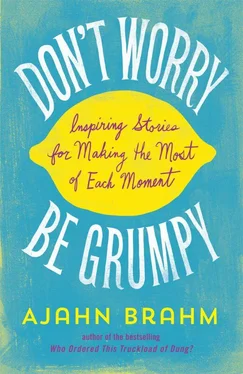One day, she was inside her house by the entrance door when she heard the ghost of her dog bark just outside. She quickly opened the door, expecting to see him for sure this time, but again her beloved dog was not to be seen. Something else was there, however. She looked down, and in the very middle of the welcome mat was her lost finger ring. Her deceased dog had found it for her.
Much of her sadness disappeared after that. Death was not as final a separation as she had once thought. From then on, she heard her dog no more.
Tim had migrated to Perth from London. In the middle of one night, alone in his house, he woke up and turned on the bedroom light. Standing at the end of his bed was his old mother.
His mum lived in Essex. He knew that this must be a ghost. However, he wasn’t scared at all, he told me. He was so happy and peaceful seeing his mother silently standing there, smiling at her son with unconditional love.
He knew his mum must have died, but he never felt sad. The love coming from his mother’s smile smothered any sadness.
The apparition lasted a long time, several minutes. When the ghost eventually vanished, Tim did what any Englishman would do in such a situation. He got out of bed and made himself a cup of tea!
Drinking his tea, the house phone rang. It was his sister in England.
“Tim, sorry to wake you up in the middle of the night, but I have some bad news.”
“Yes, I know,” Tim interrupted. “Mother has died.”
“How on earth did you know?” his sister exclaimed, incredulous. “We have only just returned from the hospital!”
Then Tim described his mother’s ghost. It was one of the most welcome and wonderful experiences to see his mother and bathe in her love one last time.
When I was a student, I spent many summer vacations in the mountainous wilderness areas of northern Scotland. On one cloudless day, I trekked with the warden of the local youth hostel to the top of a nearby peak. The view at the summit was breathtaking.
Being young and energetic, I suggested continuing on to the next peak, but the older warden had had enough. He told me to go alone. That was some bad advice that almost led to my death.
Halfway up the second mountain, some clouds rolled in. When I got close to the summit, the clouds descended so quickly that I was suddenly enveloped in a thick mist. I could see no more than a meter in front of me.
I had heard stories of English visitors like me being lost in the mist for days but had not believed those tales. I believed that I had a good sense of direction, so I simply turned around and went back the way I had come. With the confidence of youth, I was sure I would soon find my way back. As I carefully walked, looking at the ground two feet in front of me, which was as far as I could see, I suddenly saw the ground fall away in front of me. I almost lost my footing and fell over the precipice. I had come within one foot of a vertical cliff, within one step of a certain death.
I realized I was lost in a dangerous wilderness, in a mist that could last for days. I became worried. My confidence evaporated. I was in serious trouble.
Fortunately, I was studying physics at university. I remembered Einstein’s theory of general relativity, which also confirms the well-known fact that water travels downhill. So I found a small mountain brook, followed it to a bigger stream, and then followed that down the mountain until I was below the mist. Then I could see the landmarks to give me directions and return safely to the hostel.
Later, I looked at the map to find that the only cliff on that mountain, over a hundred feet down, was in the direction exactly opposite to where I thought I was going. So much for my innate sense of direction!
I use that anecdote to help guide people in their spiritual journeys. We all start off enveloped in the mist of not knowing. Monks and masters, teachers and guides, all tell us which path to follow, but they all say different things. Their advice is so confusing. We have no innate sense of direction.
So I suggest you find a stream, something you can follow that you know goes in the right direction, that will take you below the mist of not knowing, to see for yourself which way to travel further.
That stream is virtue, peace, and compassion. Whatever religion you follow, and even if you follow no religion, these three qualities will lead you to truth. Follow them. And experience the stream of kindfulness become wider and deeper. Soon it will take you beyond the mist of not knowing to where you can see for yourself and find your way home.
Buddhists are famous for their bowing. Westerners often ask why we bow. I answer that Buddhist bowing is an effective exercise for the stomach muscles so that you don’t get so fat!
Becoming more serious, I explain that when we bow to a statue of the Buddha, for example, we bow to the qualities that the Buddha represents to us. My own three bows to a Buddha image are to virtue, peace, and compassion.
When I lower my head to the floor for the first time, I think of virtue . Goodness is so important to me that it is easy to worship it. I find so much happiness living in a community of monks that I can trust completely. When I have the privilege of meeting good people, it brings confidence that this world is a good place. Virtue is well worth a bow. Moreover, when I bow to virtue and remember its importance, I find that my own goodness grows. Whatever you worship and remember grows stronger with every prostration.
Next I bow to peace . Peace is also important to me, both in the world outside and in the private world of my meditation. Without peace of mind and peace between peoples, there is no happiness to be found. So I worship peace, and my life becomes more serene.
Lastly I bow to compassion . Acts of kindness bring warmth and light to the world. They make suffering bearable, even giving it meaning. A life without kindness is not a life worth living. So when I bow to compassion, I become more compassionate.
That is why Buddhists bow.
A few years ago, I was invited by a Christian friend, the chaplain at a top Perth private school, to give the spiritual address at the morning assembly. When I arrived, my friend the chaplain greeted me along with the school principal.
The principal explained the order of proceedings. “We wait until the whole school is assembled and quiet, and then the three of us will walk in. As we enter,” he continued, “the chaplain and I will make a small bow to the statue of Jesus, because we are Christians. But as you are a Buddhist monk, you don’t have to bow.”
I saw an opportunity to make an important point. I turned to the principal, pretended to scowl, and remonstrated, “I demand my right, as a Buddhist, to bow to your image of Jesus!”
The principal was taken aback, allowing me to explain that I would bow to those qualities in Jesus that I, as a long-practicing Buddhist, respect. Obviously, I don’t agree with all the Christian teachings, otherwise I would be a Christian not a Buddhist, but I can see plenty that I respect and can worship, and I wanted to bow to that.
Thus it was that the three of us entered the assembly and worshiped the figure of Jesus. Then some months later, the principal visited my Buddhist monastery and worshiped the figure of Buddha.
Many people today do not like organized religion. That is why Buddhism has become so popular. Go to any ceremony in a Buddhist temple and you’ll discover why we qualify as “disorganized religion.”
Some people even ask whether Buddhism is a religion at all. The answer is “Yes, Buddhism is a religion. For tax purposes anyway.”
Читать дальше










